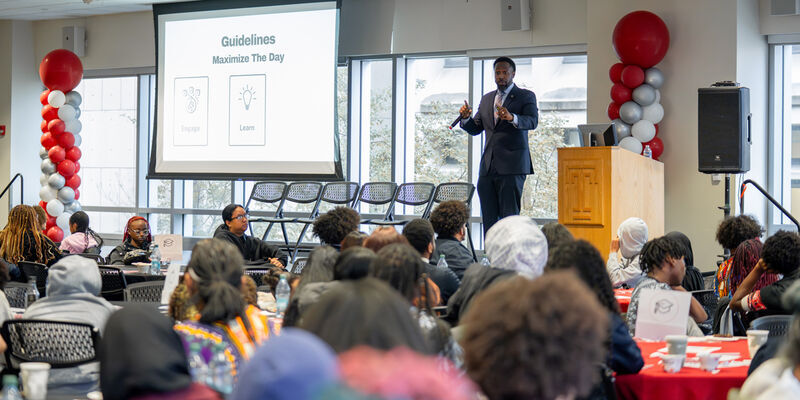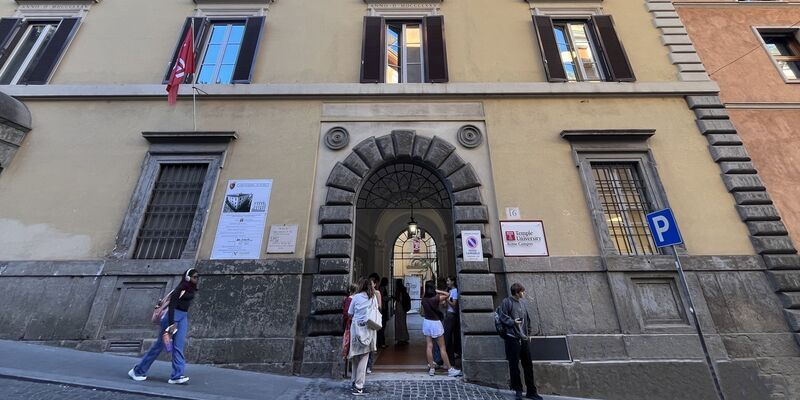Temple faculty explore AI, automation and the future of work
Faculty members and graduate students from across the university gathered at Charles Library on Wednesday, Nov. 5, for a panel discussion exploring the future of work, and how emerging technologies and policies are impacting the workforce.

The future of work has become a hot topic. Emerging technologies like AI, lingering effects from the pandemic and new government policies are rapidly changing how and where people work. But at Temple University, that uncertainty is sparking conversation and collaboration.
Faculty from across the university came together on Wednesday, Nov. 5, for Grand Challenges: A Faculty Conversation on the Workforce of the Future. The event, which was hosted in partnership by the vice president for research, the vice provost for faculty affairs and the dean of libraries, featured an interdisciplinary conversation addressing themes such as labor market uncertainty, automation, skill gaps, educational preparedness, hybrid work models and organizational leadership.
“One of the great things about being at a comprehensive research university is exactly this kind of opportunity to come together as scholars from different areas and talk about the big problems of the day,” said Vice President for Research Josh Gladden during his opening remarks. “We all know that our workforce environment is changing in many ways, very rapidly. We have a responsibility to do our best to prepare our students for entering that workforce and becoming productive members of that workforce as quickly as possible.”
Last Wednesday’s event was the fourth edition of Grand Challenges, an initiative started by Gladden; Joe Lucia, dean of libraries; and Jennifer Wood, vice provost for faculty affairs, to encourage conversation and collaboration around challenging topics.
The interdisciplinary panel included
- Crystal Harold, associate dean for master’s programs, professor of management and Paul Anderson Senior Research Fellow, Fox School of Business;
- Jennifer Lee, associate dean for experiential learning and community engagement and associate professor of law, Beasley School of Law;
- Iyad Obeid, professor and chair of electrical and computer engineering, College of Engineering; and
- Samuel Solomon, assistant professor of economics, College of Liberal Arts.
The impetus for last Wednesday’s conversation was made clear by moderator Leora Eisenstadt, associate professor of legal studies at the Fox School of Business and director of the Center for Ethics, Diversity and Workplace Culture. Eisenstadt referenced data points emphasizing major shifts in the modern workplace, such as Amazon’s plan to automate 75% of their operations, or more than 500,000 positions, reported by The New York Times.
In a recent poll by the Wall Street Journal, Eisenstadt said, more than 70% of responders said the American dream no longer holds true.
“Rather than thinking about this as a depressing moment, we can think about this as an opportunity for our university community to draw on our collective expertise, to contemplate how best to prepare our students,” she said.
Eisenstadt posed questions to the panelists about which jobs are being affected by emerging technology, the shifting relationship between employers and workers, the ways the gig economy is impacting the workforce, and skills that will remain durable as technology shifts, among other prompts.
AI was a topic of particular interest to the panelists and audience members, who had the opportunity to ask questions at the end of the panel.
“AI is wonderful for startups and entrepreneurs. The barrier to entry in the marketplace is being lowered because of these tools,” Obeid said. “People have more ability to start companies, take risks and try things, so it’s good in that regard.”
For Shohreh Amini, professor of biology and Faculty Senate president, AI has made parts of her research more efficient, but she says the tools still lack accuracy and creativity.
“I often ask my students to criticize published information. I’ll give them a research paper, which was peer reviewed, but that doesn’t mean it’s flawless,” said Amini, who attended the event. “I ask them to find problems, to tell me what controls are missing from their experiments. This is something AI cannot do. It looks at the existing data, accepts it and gives it back to you.”
The event concluded with a social hour, where panelists and audience members were encouraged to socialize and share their perspectives on the workforce of the future.
“These are the kinds of questions everyone is asking about—the future of work, the role of AI, what jobs AI will replace, what jobs AI will augment,” said Sunil Wattal, professor of management information systems and the Schaefer Senior Research Fellow. “The panel was very timely, and the panelists had a lot of great insights and examples that they shared about how to address some of these issues.”


